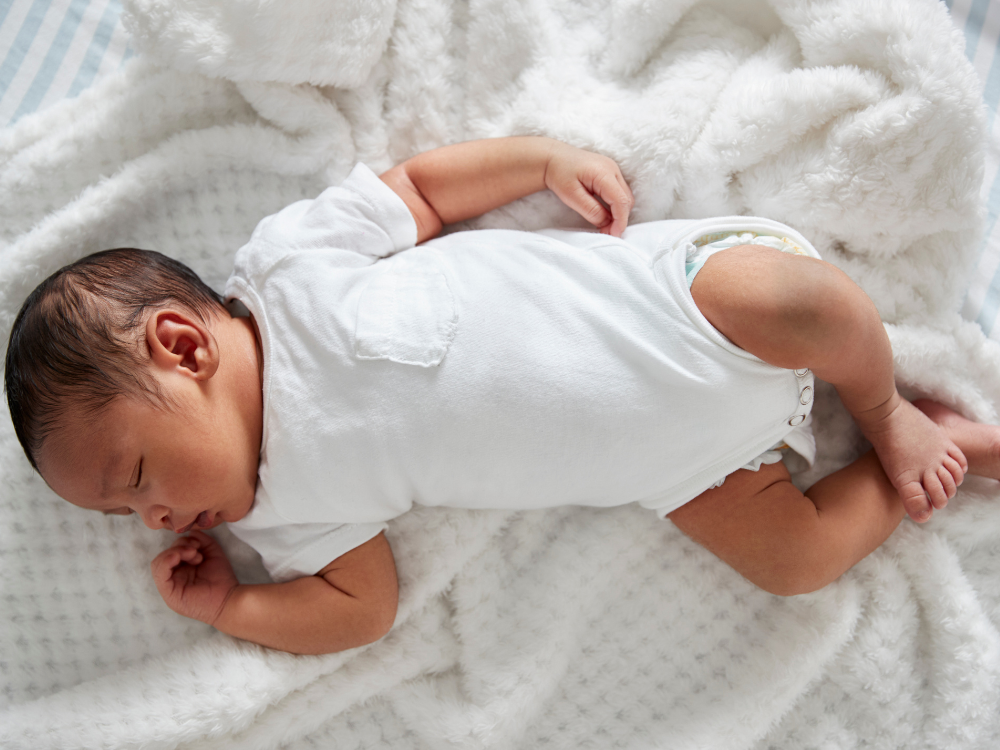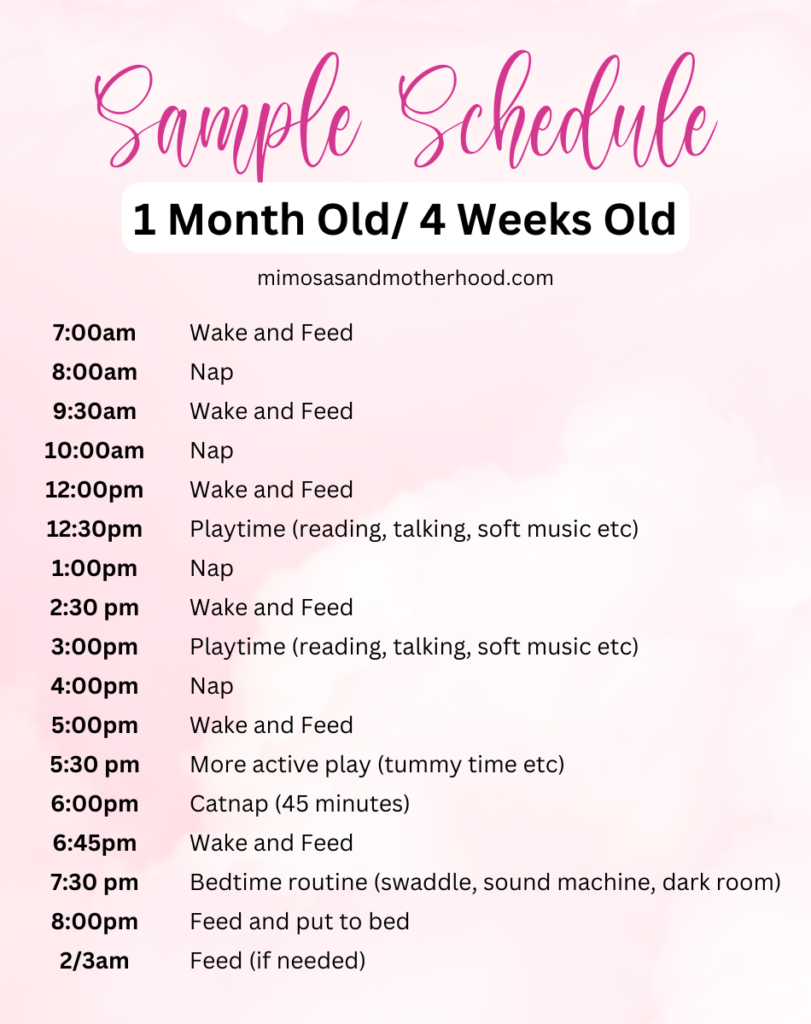1 Month Old Sleep Schedule
Learn how to help establish good sleep habits with this general guide and most important things when it comes to a 1 month old sleep schedule.

The first month with a newborn baby are full of so many special moments! As a mom of three, I know that those first few weeks can also feel like a huge learning curve.
One of the biggest for many parents is around newborn sleep. For most families, the first few weeks home are exhausting. Not only are you learning so much about parenthood and your little one, but you’re also trying to find the time to actually rest yourself.
Establishing the right 1 month old sleep schedule (or 4 week old sleep schedule) can be a game changer for both you and baby.
Note: Some links may be affiliate links. That means I may make a commission if you use my links to purchase, at no extra added cost to you! I only recommend products that I personally love and believe in. This post is not meant as medical advice and is for general information. Full disclaimer here.
What is a good sleep schedule for a 1 month old?
During the first few weeks, the most important thing to focus on first is feeding your baby and making sure they’re gaining weight. Once your baby is back up to their birth weight and your pediatrician has communicated that they are maintaining their weight curve, it’s time to start thinking about a one month old sleep schedule.
Establishing a consistent routine can make a huge difference, especially when it comes to a one month sleep schedule. A safe sleeping environment is paramount. According to the The American Academy of Pediatrics (AAP) Task Force on SIDS (Sudden Infant Death Syndrome) and National Institutes of Health, always put your baby to sleep on their back. To help reduce the risk of SIDS, they should also sleep on a firm, flat, level surface.
One of the biggest things to keep in mind at this stage is that when you hear the word “sleep schedule,” it really is more of a flexible routine. Naps can vary in length day to day, and a one month old baby shouldn’t have a set in stone schedule.
How long should my 1 month old be awake during the day?
At one month old, babies need around 14-17 hours of sleep in a 24-hour period. They usually sleep for periods of 2-4 hours at a time and wake up to feed.
Most likely your newborn will only be awake for 7-10 hours total during the day. These times are referred to as a wake window. At 4 weeks old that wake window is about 50-70 minutes at a time.
These wake windows gradually increase as your baby gets older. If baby stays awake longer, it can be harder to get your baby to fall asleep and actually stay asleep.
With a newborn you want to learn to pay attention to sleepy cues. While your baby can’t speak just yet, he can communicate that he’s tired or overtired. Here are some of baby’s cues to look out for:
- Tired: rubbing eyes, yawning, fussiness, “the stare”
- Overtired: rigid body, pushing away from you, intense crying
Sample sleep schedule for a 1 month old
Below is what your one month old’s daytime schedule might look like. This is the same schedule that I’ve followed for my own children, with emphasis on feed-wake-sleep cycles:

Remember that this sample baby sleep schedule is just a guideline; you need to be flexible with your own baby’s needs. The times don’t have to be exact: what’s more important is the time intervals between sleeping and feeding that is more important.
Focus on trying to get your baby to sleep within the end of their wake window and getting those naps to stretch to at least 45 minutes. Newborn nap lengths can vary from day to day. You might also find that your baby needs earlier bedtime or later bedtime.
The goal is for baby to be getting 14-18 hours of sleep total within 24 hours. Try to keep the wake window consistent and begin introducing a bedtime routine.
What is a bedtime routine for a 1 month old?
I firmly believe that it’s never too early to start a bedtime routine for your baby. While a newborn might be too young to recognize the routine, it can still be very calming for them.
A newborn bedtime routine doesn’t have to be complicated! Here is the bedtime routine I use with my own babies:
- Bath
- Diaper, lavender lotion, pajamas with a lullaby
- Swaddle
- Feed
- Lay down in the crib or bassinet in a dark room with white noise (we love the Hatch nightlight!)
How can I get my 1 month old to sleep?
The truth about baby sleep is that newborns need help to become great sleepers. During the newborn stage they can sometimes experience day-night confusion with their circadian rhythms. This is where they want to sleep all day and are up all night, which is why working to establish a sleep routine or schedule is valuable.
Newborns can also be very active sleepers, moving around and making noise while still asleep. This is actually ok, and you want to avoid trying to soothe your baby as you might unintentionally wake him up instead.
If your baby is fussy and unable to sleep, there are a few things that can cause that like:
- Hunger
- Gas (here are 3 techniques to burp your baby)
- Needs a diaper change
- Being overstimulated
- Being overtired
Learn more about how to get a baby to sleep in a bassinet.

How long should I let my 1 month old sleep at night?
How long your baby is able to sleep at night depends on each child. While your baby will be in their sleep space for 9-12 hours at night, most 4 week old babies are still waking up throughout the night for feedings and comfort.
Until your pediatrician has given you the go ahead to no longer wake your baby for night feeds, you don’t want to let your baby sleep longer than their week in age plus one hour, gradually working up to longer stretches.
If your baby is 2 weeks old, their longest stretch of nighttime sleep should be 3 hours. If they’re 4 weeks old, the longest sleeping stretch should be 4 hours. However, some babies will need more night wakings if they need additional nighttime calories. Talk to your healthcare provider about your own child and any medical questions.
Wondering what to do with a baby during the day? Check out these infant development activities, outdoor activities for babies, or 13 Engaging Activities for Your 1 Month Old Baby.
When do babies start sleeping through the night?
Sleeping through the night is defined by many experts as sleeping 6-8 hours without waking. Most babies aren’t able to do this until about 3 months old, and that is completely normal.
If your baby is younger than this and seems happy sleeping for 6+ hour stretches without needing to eat, check with your pediatrician to be sure that your child has gained enough weight to not need to be woken to feed.
Some children start sleeping through the night much sooner than others. It’s truly different for every baby.
What should a 4 week old baby wear to sleep?
You want your one month old baby to be at a comfortable temperature when sleeping. What your baby wears to sleep will vary on the time of year and temperature in your house. Overheating can be very dangerous for babies, and you also don’t want your baby to be cold as that will impact their sleep.
For warmer homes, a diaper, short sleeve onesie and swaddle is appropriate for sleep. For colder homes, your baby might wear a diaper, footie pajamas (also known as a sleep and play) and a swaddle.
Newborn babies should be swaddled while sleeping. It’s safe and beneficial for your little one, and mimics the secure feeling they had in the womb. There’s a difference between receiving blankets and swaddle blankets.
For my babies, I have always used The Ollie Swaddle. It is the only swaddle that our family has found works for a variety of baby sleep needs and sizes. We use the same Ollie with our oldest, who was in preemie size for a full month after birth, as well as our second child who was almost 9 pound when born.
A swaddle should be dropped for another transitional item (like the Merlin sleep suit) when your baby shows signs of rolling.

Can a 1 month old sleep with a pacifier?
Pacifiers can be a great tool to help your baby sleep well. There are many options on the market, including pacifiers for breastfed babies. You might need to experiment with different options to find the one your baby loves.
One Month Sleep Schedule: Summary
The first month truly feels like it flies by. Helping to establish great sleep habits during the first few weeks by following a routine, not rigid schedule, can help you and your baby feel better and sleep better.
Here are the most important things to remember:
- Be flexible with your newborn sleep schedule and nap times
- Try to keep wake windows between 45 minutes and 1 hour at 4 weeks old, gradually increasing.
- Don’t let your baby nap for more than 2 hours at a time.
- Make sure your baby is getting 14-17 hours of total sleep in a 24 hour period
- Aim for full feedings and plenty of calories during the day to help with healthy weight gain and better nighttime sleep
So much changes in the first year! Establishing healthy sleep habits during the first weeks can help baby’s sleep patterns continue to improve during the first year.







